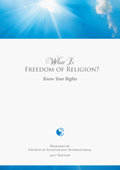The right to freedom of religion or belief is a fundamental right of every human being everywhere. But around the world, freedom of religion is under assault, with severe restrictions rising in all five major regions of the globe in the last decade.
Abuses of the right to religious freedom are widespread and impact people throughout the world. Religious organizations and individuals who associate in religious communities must overcome increasing repression when they express their beliefs or manifest their religion in public.
People of goodwill can do much to work together to reverse the rising tide of religious repression and strengthen the universal right to religious freedom for all. First, they can understand the nature of the right to religious freedom and take action against the ongoing threats to that right. Second, they can implement these principles of religious freedom by respecting the rights of all faiths and beliefs, with discrimination toward none. Finally, they can work together with people of all faiths to promote and protect freedom of religion and tolerance for all on the domestic and international level.
Rising Social Hostility Against Religion
in the Media
The Pew Research Center global study on the rising tide of restrictions on religions finds that approximately five billion people, 75 percent of the world’s population, live in countries with high government restrictions on religion or high social hostilities involving religion, which often target religious minorities. [41]
There is no question that the media — all forms of the press, including print, audiovisual and electronic media — constitute a major cause for this high social hostility targeting religious groups throughout the world. The instances where some religion is the target of propaganda, bias, stereotyping, misconception, misunderstanding and incitement to hatred in the press in countries across the globe have become legion.
The episode in 2005 regarding the publication of cartoons depicting the Prophet Mohammed and the subsequent violent reactions across the Islamic world raised the attention of the global community to the misunderstandings and lack of information within the media on matters relating to religion and belief. Yet bias and misinformation in the press continue to be a scourge, fostering religious discrimination and fueling hostility toward targeted faiths. [42]
No universal set of principles, rules or standards in this critical area regarding the depiction of religion or belief by the media currently exists. Without clear articulation of such principles and standards, there is no effective means to gauge whether news reports violate universal human rights standards while engendering discrimination or even violence targeting individuals due to their religious association.The time has come to articulate a set of standards, based upon the human rights principles that make up the right to freedom of religion, to guide the media in the area of religion or belief. To address this pressing need, a proposed Charter on Journalistic Ethics in Relation to Respect for Religion or Belief (“Charter”) is contained in the next section as a tool to educate the media on the right to religious freedom and establishing proper standards for religious tolerance in reporting on religious matters.
This Charter was created by taking into account over forty national journalistic ethics codes, more than three hundred professional journalist codes, and the relevant documents articulating OSCE, Council of Europe and UN standards that are contained in this publication. The Charter takes into account the paramount principles of freedom of expression and freedom of religion and attempts to strike an appropriate balance that preserves both of these fundamental freedoms.
[41] “Rising Tide of Restrictions on Religion,” September 2012, Pew Research Center.
[42] See, e.g., Copenhagen Danish Institute for International Studies, Rytkonen, Helle “Drawing the Line: The Cartoons Controversy in Denmark and the US,” 2007; Islamic Monthly, “America’s Latest Outsiders: The Struggle of Religious Minorities throughout History,” 13 March 2013; Bahá’í World News Service, “A Case Study in Religious Hatred,” 7 December 2013; Commentary, “The Guardian Acknowledges a Degree of Anti-Semitism,” 10 November 2011.




























